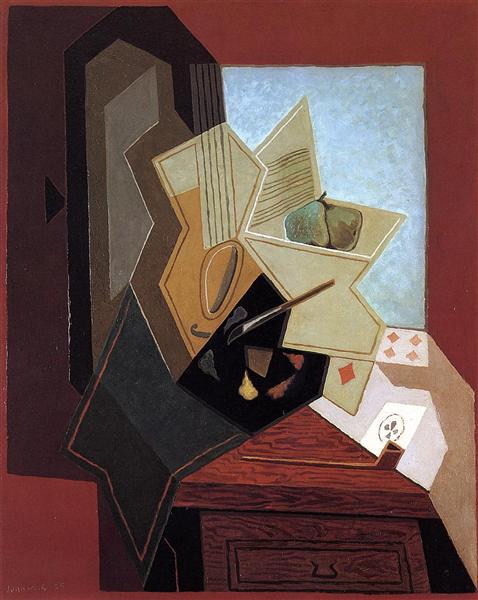Popis
In The Painter's Window (1925), Juan Gris, one of the masters of Cubism, presents a work that transcends mere visual representation to offer a complex integration of shapes, colors and meanings. This canvas represents not only the artist's window, but also a portal to his inner world and the interpretation of the environment that surrounds him. With a renewing approach, Gris combines elements of tangible reality with the Cubist decomposition that defines his style.
The composition of the work is a clear testimony to Gris's mastery of form and space. The canvas is structured by a series of planes that interact with each other, creating a sense of depth without the traditional mirrors of classical perspective. The geometric shapes, predominant in his visual language, seem to almost float, encompassing the entire surface. In this work, elements such as the window, the table and a series of objects are arranged with such precision that they seem to dialogue with each other, revealing the most subtle connection between the painter and his environment.
The use of color is another aspect to highlight in “The Painter’s Window.” Gris opts for a range of earthy tones mixed with soft shades of blue and pink, giving the piece an energetic and dynamic atmosphere, evoking the natural light that peeks through the window. This handling of color is not merely decorative; it contributes to the creation of a specific mood that expresses the artist’s interaction with his medium. The choice of warm and cool colors not only establishes visual contrasts, but also evokes emotions that resonate with the viewer.
Despite the absence of visible human figures, the work suggests the presence of the artist. The window becomes a symbol of observation and contemplation, a space where the creator can merge his inner experience with external reality. This is characteristic of Cubism, which often seeks to represent not only the external form of objects, but also the experience of the artist himself.
In this sense, The Painter's Window reflects Gris's interest in exploring his immediate surroundings, something that can also be seen in other works of the period. His compositions often include elements of everyday life, presented through the lens of cubist deconstruction. This allows the viewer active contemplation, inviting them to join in the process of reconstructing the visual narrative.
Juan Gris, originally from Spain, moved to Paris where he became a central figure in the Cubist movement, influenced by his contemporaries such as Pablo Picasso and Georges Braque. His distinctive style is characterized by a structural clarity and a focus on ornamentation that not only observes but also reinterprets the motifs of modern life. The Painter's Window fits into this context as a work that encapsulates the essence of his creative process, fusing observation with invention.
Ultimately, The Painter's Window is more than just a representation marked by geometry and color; it is a manifestation of Juan Gris's worldview. It challenges the viewer to observe, to reflect on the relationship between the artist and his surroundings, and to understand that each window is, in essence, also a look into the very essence of artistic creation. With its complex structures and evocative palette, the work continues to resonate in a special way in the study of Cubism and in the understanding of modernity in art.
KUADROS ©, a famous painting on your wall.
Hand-made oil painting reproductions, with the quality of professional artists and the distinctive seal of KUADROS ©.
Painting reproduction service with satisfaction guarantee. If you are not completely satisfied with the replica of your painting, we will refund 100% of your money.

